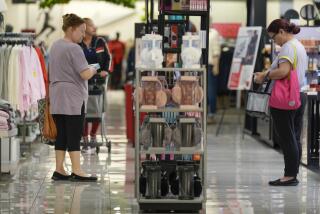Major chain stores post 4.2% sales increase in January
Shoppers turned out at the nation’s malls in January to redeem holiday gift cards and check out winter sales, spending carefully but sufficiently to help retailers clear their shelves before the spring buying season.
In a solid showing for a typically slow month, major chain stores posted a 4.2% sales increase in January compared with the same month last year, according to Thomson Reuters. The results handily beat analysts’ expectations of a modest, 2% rise.
January is considered by many retail experts to be the least important month of the year as stores unload their winter and holiday items. The months ahead, when retailers roll out spring and summer apparel and accessories, will provide a better gauge of how retailers will fare this year, they said.
“There were no real surprises in January. I have seen a consistency of performance by a number of retailers month after month delivering” strong sales, said Michael Brown, a partner in the retail practice at consulting firm A.T. Kearney. “This report shows some good tail winds for 2012.”
At the South Bay Galleria in Redondo Beach on Wednesday, shopper Sheryl Whitfield said that after restricting herself to a tight budget during the holiday season, she was happy to be splurging a little for her birthday.
“I didn’t go overboard for Christmas, but I am going crazy this past week,” said the Westchester elementary school teacher, showing off a pair of black peep-toe booties she bought for $148. “I’ve been shopping all week, but you only turn 50 once. And I’m going to try not to shop for the rest of the year.”
Industry watchers said sales were helped by gift-card redemption and heavy promotions by merchants, who were pushed by a relatively mild winter in many parts of the country to heavily slash prices on cold-weather apparel.
Top performers were a mixture of high- and low-end stores. Action-sports chain Zumiez Inc. led the way with a 10.8% bump. Buoyed by a comeback of wealthy shoppers, luxury retailer Saks Inc. reported a 10.5% increase, while Nordstrom Inc. posted a 5% gain. Costco Wholesale Corp. said sales rose 8%. Limited Brands Inc., parent company of Limited and Victoria’s Secret stores, had a 9% increase.
Other retailers did not fare so well. Teen clothier Wet Seal Inc. said sales fell 13%, while struggling apparel giant Gap Inc. reported a 4% drop. All told, about 60% of retailers beat expectations and 40% missed estimates, according to Thomson Reuters’ tally of 20 major chain stores, including department stores, discounters and apparel sellers.
Results were based on sales at stores open at least a year, known as same-store sales and considered an important measure of a retailer’s health because it excludes the effect of store openings and closings.
Retail analysts caution that most shoppers still aren’t spending freely because they continue to worry about their jobs and the economy. Although the industry did modestly well during the holidays, some say that shoppers will cut back their spending in the months after Christmas.
“The savings rate is going up and disposable income is flat to down,” said Robin Lewis, a retail consultant and chief executive of the Robin Report, a retail industry publication.
He said consumers dug into their savings to buy gifts during the holidays but will probably not do so again this year.
Other industry watchers were more optimistic, pointing out that consumer confidence should be bolstered by recent signs that the job market and manufacturing were picking up slightly.
“Consumers are still going to go out and shop. They will just be very smart and look for value,” said Brown, the analyst.
At the South Bay Galleria, Marvin Thomas, 42, was hunting for bargains and had snapped up a pair of black leather loafers reduced to $20 from $70. After four years of abstaining from buying clothes, Thomas said he had squirreled away money over the last year to spruce up his wardrobe.
“I believe the economy is still jacked up,” the Gardena barber said. “But there are great deals out there, and I just really need some slacks, shirts and shoes.”
Last month, department store chain J.C. Penney Co. announced it would stop reporting sales on a monthly basis, a move that follows similar decisions by other retailers such as Wal-Mart Stores Inc., Abercrombie & Fitch Co. and American Eagle Outfitters Inc.
Retail executives say reporting on a monthly basis puts too much focus on short-term results, but analysts and economists say that not reporting monthly sales makes it harder to get an accurate gauge on the overall industry.
For February, the International Council of Shopping Centers is predicting a 3% to 3.5% sales increase.
More to Read
Inside the business of entertainment
The Wide Shot brings you news, analysis and insights on everything from streaming wars to production — and what it all means for the future.
You may occasionally receive promotional content from the Los Angeles Times.











